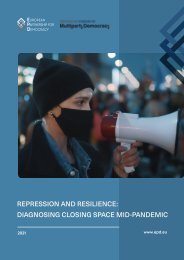Thinking Democratically: A Comprehensive Approach to Countering and Preventing Shrinking Space
You also want an ePaper? Increase the reach of your titles
YUMPU automatically turns print PDFs into web optimized ePapers that Google loves.
3.5 International donors<br />
International donors can play a major role in capacitating civil society <strong>and</strong> political ac<strong>to</strong>rs <strong>to</strong> defend<br />
<strong>and</strong> exp<strong>and</strong> democratic space, in addition <strong>to</strong> their diplomatic leverage as global political players.<br />
The case of Georgia illustrates this well. Through cooperation under the EU-Georgia Association<br />
Agreement <strong>and</strong> the Visa Waiver decision, the EU has encouraged two successive ruling parties <strong>to</strong><br />
implement substantial reforms in the justice system, public administration <strong>and</strong> human rights<br />
framework. In addition, the Venice Commission of the Council of Europe has played a major role in<br />
protecting democratic space through its opinions on the ongoing constitutional reform. This shows<br />
the potential impact of a coordinated <strong>and</strong> strategic approach <strong>to</strong> supporting democratic space in<br />
countries where the EU has such incentive mechanisms.<br />
When it comes <strong>to</strong> strengthening civil society, however, trends among European donors have not been<br />
so supportive of democratic space <strong>and</strong> those who defend it. In Kenya, Zimbabwe <strong>and</strong> Indonesia,<br />
shifting donor priorities have resulted in a reduced amount of resources for civil society. Within this<br />
restricted funding pool, there has been less appetite for watchdog-like activities, <strong>and</strong> more for<br />
governance support <strong>and</strong> technical support <strong>to</strong> civil society for contributing <strong>to</strong> government-led<br />
processes. In Kenya <strong>and</strong> Indonesia, this trend has been particularly strong among the bigger donors,<br />
while smaller donors have continued support <strong>to</strong> CSOs in a more political manner. In Zimbabwe, the<br />
sudden reduction in funding after 2013 has greatly limited CSOs’ ability <strong>to</strong> defend democratic space<br />
<strong>and</strong> has created competition for scarce resources between different CSOs.<br />
In Kenya <strong>and</strong> Indonesia, the shift in funding away from critical CSOs, <strong>to</strong>wards government-led agendas<br />
for change <strong>and</strong> governance assistance has resulted in part from an apparent improvement in the state<br />
of democracy. In addition, both countries grew economically from lower income countries <strong>to</strong> middleincome<br />
countries, which also significantly reduced the amount of funding provided by donors. Latin<br />
American countries have faced the same problem. However, the difficulties civil society face in<br />
countering shrinking democratic space <strong>and</strong> coping with the reduced amount of funding points <strong>to</strong> the<br />
need for donors <strong>to</strong> remain engaged with civil society on such activities. By giving the government<br />
control over the type of assistance provided <strong>to</strong> civil society, donors limit the ability of CSOs <strong>to</strong><br />
effectively influence policy <strong>and</strong> maintain critical functions as a counterbalance <strong>to</strong> the state.<br />
In Zimbabwe, the EU’s political strategy of reengagement with the government resulted from a<br />
perceived political opening <strong>and</strong> was in principle welcomed by Zimbabwean civil society. However,<br />
its narrow scope was overly focused on pushing for ‘constructive engagement’ of Zimbabwean civil<br />
society with the government – rather than fulfilling their role as a watchdog – at a time when<br />
democratic space was still very clearly under attack. The relationship between Zimbabwean civil<br />
society <strong>and</strong> donors sometimes became uneasy, as donors frequently accused civil society of being<br />
partisan <strong>and</strong> against the government. The incoherence of donors’ political agenda’s in combination<br />
39

















